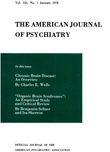Memory and convulsive stimulation: effects of stimulus waveform
Abstract
Electrical stimulation with brief pulses can produce a seizure requiring less energy than conventional sine-wave stimulation, and it has been suggested that brief-pulse stimulation might reduce the memory loss associated with electroconvulsive therapy (ECT). The authors evaluated the effects of electroconvulsive shock (ECS) on memory in mice by using various waveforms, current intensities, training-ECS intervals, pulse widths, and stimulus durations. When equated for ability to produce seizures, low-energy, brief-pulse stimulation caused as much amnesia as sine-wave stimulation and sometimes more. In the absence of comparisons of the amnesic effects of brief-pulse and sine- wave stimulation in humans, the use of brief pulses for administering ECT is unwarranted.
Access content
To read the fulltext, please use one of the options below to sign in or purchase access.- Personal login
- Institutional Login
- Sign in via OpenAthens
- Register for access
-
Please login/register if you wish to pair your device and check access availability.
Not a subscriber?
PsychiatryOnline subscription options offer access to the DSM-5 library, books, journals, CME, and patient resources. This all-in-one virtual library provides psychiatrists and mental health professionals with key resources for diagnosis, treatment, research, and professional development.
Need more help? PsychiatryOnline Customer Service may be reached by emailing [email protected] or by calling 800-368-5777 (in the U.S.) or 703-907-7322 (outside the U.S.).



